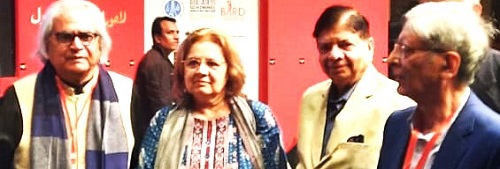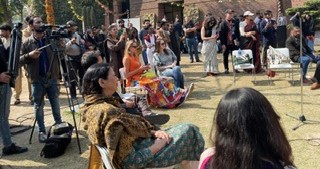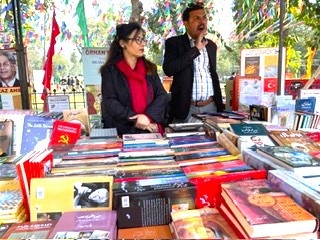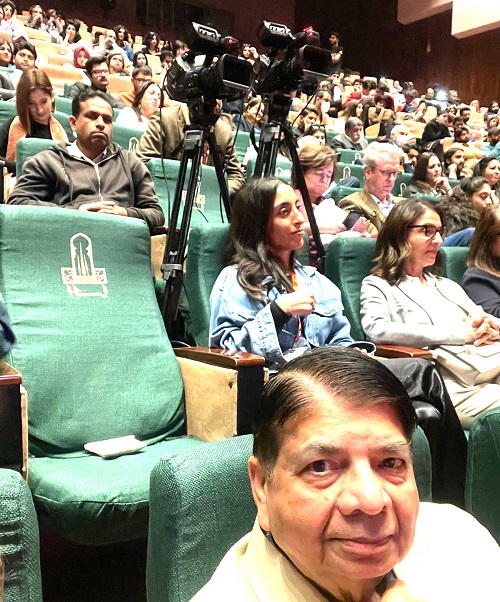A Visit to the Lahore Literary Festival
By Zafar Iqbal, PhD

The Lahore Literary Festival (LLF), an annual extravaganza held in Lahore, has earned its reputation as one of South Asia's premier cultural events. Over three dynamic days, the LLF unfolds at the Alhamra Arts Center (Lahore Arts Council), becoming a vibrant hub for writers, artists, scholars, and poets. This literary celebration transcends national borders, drawing luminaries like Nobel Laureates Abdulrazak Gurnah and Booker Prize winners Shehan Karunatilaka and Damon Galgut.
 Iftikhar Arif, Nuzaira Azam, Zafar Iqbal, and Atizaz Ahsan Iftikhar Arif, Nuzaira Azam, Zafar Iqbal, and Atizaz Ahsan
 Group photograph Group photograph
|
 The event in the open
The event in the open |

Book Stalls

Group picture
|

Audience |
 Event outside
Event outside |
The festival's diverse program showcases talents ranging from magical realist writers to poets and renowned figures like Romila Thapar, Abdullah Hussein, Ayesha Jalal, Asma Jahangir, Eve Ensler, Roger Cohen, Mohsin Hamid, Laurent Gayer, Rahul Singh, Hameed Haroon, Yasmine El Rashidi, Naseeruddin Shah, Joe Sacco, Romesh Gunesekera, Ziauddin Sardar, Osman Samiuddin, Mushtaq Soofi, and Aminatta Forna.
Beyond its star-studded lineup, the LLF plays a pivotal role in promoting literature, offering a myriad of presentations, readings, and events. Serving as a launching pad for new authors, the festival provides attendees with a unique opportunity to engage with literary voices, both emerging and established.
The impact of the festival extends beyond the literary realm, drawing a diverse audience to the halls and grounds of the Alhamra Arts Centre. Students, professionals, and enthusiasts alike fill the sessions, creating an inclusive atmosphere.
Established in 2013, the LLF holds a special place in Lahore's cultural landscape. While the city has a rich history of mushairas and Urdu literature gatherings, the LLF stands out as an internationally recognized event, bringing global authors and journalists together to foster discourse on matters of national and global concern, making it a distinctive addition to Lahore's cultural calendar.
In essence, the LLF successfully fulfills the purpose of literature festivals by celebrating books, writers, and readers. It has carved its space as a vital and enriching cultural event, contributing significantly to the vibrant tapestry of literary festivities in the region.
Throughout the immersive three-day festival from February 23 to 25, 2024, I found myself entangled in a scheduling dilemma, navigating through a plethora of simultaneous sessions dispersed across various locations within the complex. Amid this captivating chaos, the session on Sher-o-shaeri captivated my attention, boasting the presence of the eminent poet Iftikhar Arif and Wajid Jawad, the esteemed President of Anjuman Taraqqi-e-Urdu. Steering the discussion with finesse was the adept moderator, Qasim Jafri.
Of all the engaging discussions, I found Iftikhar Arif's reflections on his days in Lucknow particularly captivating. A graduate of Lucknow University, he was not only a poetic luminary but also a favored student of my father, Professor Shujaat Ali Sandelvi. He left Lucknow, but Lucknow has not left him.
During the session, Arif delved into the literary contributions of Meer Taqi Meer and shared a poignant memory about the unfortunate disappearance of Meer's grave. Located near City Railway Station, it is believed that, during the British period, the grave succumbed to the encroaching railway tracks. A solitary stone was placed nearby, serving as a melancholic marker for the once-hallowed ground. Sadly, the exact location of Meer's final resting place remains unmarked, lost to time and progress. However, a small park had a statue resembling Meer with an iconic pen in front of the famous Rifa-e-Aam Club. This too has fallen victim to the city's development schemes.
Most of the discussion focused on great Urdu poets of all times, and the consensus is on the following five poets: Meer Taqi Meer, Nazeer Akbarabadi, Mirza Ghalib, Allama Iqbal, and Faiz Ahmad Faiz. Chaudhary Aitzaz Ahsan actively participated in the discussion, displaying his eloquence by reciting verses from the masterpieces of legendary poets. His exceptional memory for poetry became evident as he effortlessly recalled the renowned nazm "Sukoon Hi Sukoon Hai," written by Iftikhar Arif in the aftermath of Zulfiqar Ali Bhutto's hanging. During moments of difficulty in recalling the poem, Arif provided valuable assistance, contributing to the richness of the discussion.
On popular demands, Arif recited a portion of his famous poem, BarvaN khilaDi.
bārahvāñ khilāḌī bhī kyā ajab khilāḌī hai
khel hotā rahtā hai shor machtā rahtā hai
daad paḌtī rahtī hai aur vo alag sab se intizār kartā hai
ek aisī saa.at kā ek aise lamhe kā jis meñ sāneha ho jaa.e
phir vo khelne nikle tāliyoñ ke jhurmuT meñ
ek jumla-e-ḳhush-kun ek nāra-e-tahsīn
us ke naam par ho jaa.e sab khilāḌiyoñ ke saath
vo bhī mo'atabar ho jaa.e par ye kam hī hotā hai
Beyond his prowess in poetry, Chaudhary Aitzaz Ahsan is a well-esteemed politician and lawyer, having held significant positions such as the Leader of the House in the Senate of Pakistan and Leader of the Opposition in the Senate. His multifaceted career includes service in various ministerial roles, highlighting his dedication to public service.
Ahsan's influence extends beyond legislative roles; he played a pivotal part in the Movement for the Restoration of Democracy, demonstrating his commitment to democratic values and governance in Pakistan.
Wajid Jawad captivated the audience by presenting Punjabi translations of Mirza Ghalib's timeless ghazals, well-known to many through their enchanting portrayal in the film "Mirza Ghalib."

